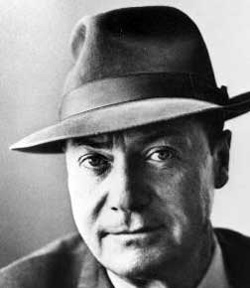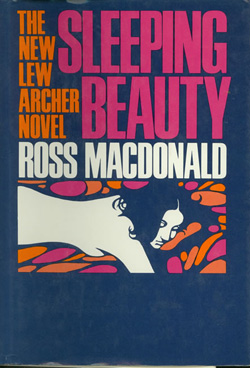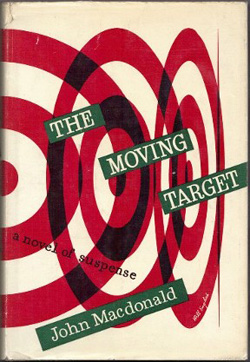
But more than the price, it was Macdonald’s style that got me—writing of the times, but using language from earlier times: “. . . the boys with John-The-Baptist hair, girls dressed like Whistler’s mother.” (Instead of hippie guys and girls in granny dresses.) Forging the perfect simile: “A cormorant flew across the water like an urgent afterthought.” Nailing a minor character in a half-sentence: “. . . she sat behind the cash register as if she was piloting a plane.”
Later, after reading more of his books, which seemed to sprawl but were, actually, tightly plotted, I came to understand it wasn’t just the words, but the meaning of the words—the story behind the story—his way of uncovering past sins, buried in memory and regret, that hooked me.
 Macdonald hooked a great many famous current detective fiction writers too. Michael Connelly, Sue Grafton, Lawrence Block, and Richard North Patterson, are just a few who’ve said that it was Macdonald’s footsteps they followed down the mean streets. Think of the two Roberts, Parker and Crais. Both of their heroes, Spenser and Elvis Cole, just like Lew Archer, search for missing children.
Macdonald hooked a great many famous current detective fiction writers too. Michael Connelly, Sue Grafton, Lawrence Block, and Richard North Patterson, are just a few who’ve said that it was Macdonald’s footsteps they followed down the mean streets. Think of the two Roberts, Parker and Crais. Both of their heroes, Spenser and Elvis Cole, just like Lew Archer, search for missing children.
When Macdonald’s first book, The Moving Target, came out in 1949, Raymond Chandler, who by then was moving into iconic status, perceived Ross as a threat and denounced Macdonald’s writing. But then Chandler, who was always a mama’s boy and his own prickly self, didn’t much like anybody. He couldn’t get along with Billy Wilder for crissakes!
If James M. Cain was detective fiction’s 30-minute hard-boiled egg, Hammett its errant knight, and Chandler (despite the previous I still love the guy) its southern California stylist, then it is Macdonald who elevated the genre.
Yeah, he writes stories about detection and crime and foul deeds, but what he really writes about are families—about the sins of the fathers, and mothers, and every family member, including yourself—that screw things up royally. And so when Lew Archer is summoned, he picks and pulls at the errant thread and eventually unravels the tapestry of deceit—from discovering whether it was the wastrel son or the sexpot daughter who pushed millionaire papa into the deep end (The Drowning Pool) . . . to finding a runaway bride (The Chill) . . . to locating the wayward son (The Galton Case) . . . to tracking a missing child who might be the sacrificial pawn in a game of marital chess (The Underground Man).
Macdonald’s style was, in truth, the sleek package for delivering a trainload of Freudian issues, Greek tragedy, and vivid imagery: “I could see the enormous slick spreading like premature night across the sea” (Sleeping Beauty); “Number seventeen needed paint, and leaned on its pilings like a man on crutches” (The Chill); “. . . Truttwell himself looked rather artificial, like a carefully made wax image wired for sound” (The Goodbye Look).
The late Nora Ephron said her parents always admonished her that life “was copy.” In other words, everything’s up for grabs and you must use your own life, your own experiences for material.
Macdonald did exactly that. And while his books aren’t autobiographical, the themes, the people who came to life on his pages with their own petty plans, their hurts (real or imagined), and their desperate actions at trying to uncover the truth or bury the past, had their genesis in his own life.

In Macdonald’s stories, as Nolan tells us, “. . . ordinary families became the stuff of mystery; and there was always enough guilt to go around.”
We all seek order in our lives; consistency in our beliefs and perceptions. So what happens when one of our beliefs conflicts with another previously held belief? The term cognitive dissonance is used to describe the feeling of discomfort that results from holding two conflicting beliefs. When there is a discrepancy between beliefs and behaviors, something must change in order to eliminate or reduce the dissonance.
And that, I think, is Macdonald’s writing raison d’être. He understood, perhaps needed, to take the tragedies of ordinary life (although, what the hell is an ordinary life?) and make them mythical to better comprehend their meaning and significance in his own life. “I wasn’t Archer,” he said, “but Archer was me” (Hardboiled Mystery Writers).
And in his journey of self-discovery, in his oeuvre of eighteen books where he brought the crime novel off the streets and into our living rooms—and, yes, bedrooms—where he introduced us to mothers and fathers who didn’t need a .38 to put a bullet in our souls, he created his own Diogenes with an office on Sunset Boulevard: a reluctant hero who doesn’t only solve the crime, but also shows us the deeper, hidden reasons it was committed, illuminating the path for us all.
John Geraci is an award-winning screenwriter who recently turned his talents to fiction. He looks forward to this December and the launching of his novel Dead Man Talking—a thriller set in a Southern California beach town where the dead bodies are beginning to outnumber the tanned ones.
Read all posts by John Geraci at Criminal Element.

Excellent post on why Macdonald is so amazing. I recall seeing that same Sleeping Beauty cover in my parents’ library when I was little. I love him, love Archer, and even sometimes love him more than I do Chandler.
This is a great piece on a great writer.
“He understood, perhaps needed, to take the tragedies of ordinary life… and make them mythical to better comprehend their meaning and significance in his own life.” Nicely said.
Just a great essay. I have to track down that biography. Interestingly enought, I came to MacDonald in college. I showed up and they gave me the wrong class. Having 5 of his books to read over the weekend, I read them all, barely sleeping. On Monday they gave me my new class, James Joyce. One thing I discovered is that Joyce lacks the elegance and sense of inner turmoil of MacDonald. I hated that class and missed those five books I’d read.
Thanks for reminding me how good MacDonald is.
-Weston
I was so pleased to come across this essay. I don’t think Macdonald gets nearly enough attention these days. His stories and characters were always filled with so much compassion.
Beautifully d0ne. I recently picked up Tom Nolan’s bio (highly recommended for any MacDonald lover). and found that the roots of MacDonald’s angst lay with a very tough growing up in Canada, and his personal redemption he found producing some of the most compelling crime fiction written in the entire 20th century, IMHO…I feel his work is extrordinary and very timeless…
I needed to thank you for this incredible read!! I unquestionably adored each and every piece of it. I have you bookmarked your site to look at the new stuff you post.